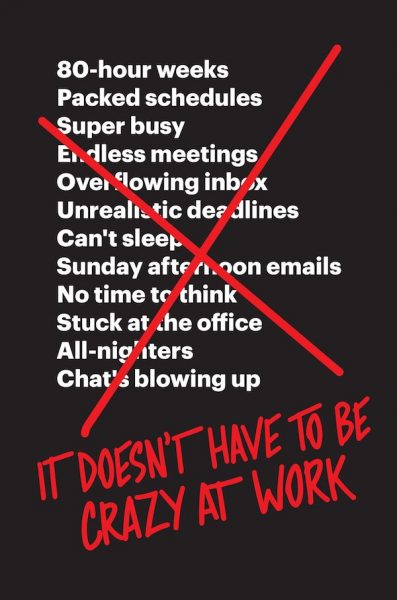Billfold Book Review: It Doesn’t Have to be Crazy at Work

I have been in love with both Basecamp’s products and their processes for years. I still use a very old version of Basecamp as part of my Getting Things Done tracking system. I read Basecamp’s Signal v. Noise blog for years and somehow mistakenly thought they’d all stopped blogging — but they haven’t, so I just re-added Signal v. Noise to my Feedly.
I was also the first person at my local library to check out Basecamp founders’ Jason Fried and David Heinemeier Hansson’s newest book, It Doesn’t Have to be Crazy at Work. (I know this because I put a hold request on a copy months in advance, and got the coveted first position in line.)
Then I read the book twice, because it’s that good.
If you’re not able to control the processes of your own job, you’re probably going to find most of this book either frustrating or irrelevant. It’s really designed for entrepreneurs and company founders who want to create the type of sustainable company that gives everyone involved the opportunity to be successful both at work and outside of it. Since I’m currently working on building a sustainable Billfold — and since I’ve always been interested in how people do their best work — I found a lot of this book extremely thought-provoking.
I’ll share just two lessons from It Doesn’t Have to be Crazy at Work, both of which I think apply to everybody:
The Trust Battery
Fried and Hansson explain that if you want someone to like you, especially at work, you have to earn their trust. It isn’t so much about personality as it is about meeting expectations: if you behave in a way that matches the other person’s expectations, the trust battery goes up; if you don’t, it goes down.
In other words: every time you miss a deadline or show up unprepared to a meeting (and the book argues that we need to radically rethink both deadlines and meetings, but that’s a whole ‘nother discussion) the trust battery between you and your boss goes down. It works the other way, too: every time your boss increases a project’s scope or asks you to stay late, the trust battery between the two of you drops.
There is an individual trust battery between every two people (you might have high trust levels with one coworker and low trust levels with another), and the only way to recharge the battery is by changing your behavior:
The reality is that the trust battery is a summary of all interactions to date. If you want to recharge the battery, you have to do different things in the future. Only new actions and new attitudes count.
I’ve started reframing all of my interactions through the trust battery lens and the theory HOLDS UP. (The trick, of course, is deciding what to do when you find yourself in a low-trust-battery relationship. When do you work on recharging the battery and when do you work on finding another boss/partner/friend/etc.?)
The Two Tokens
In every negative interaction there are two tokens — more literally, two options — in front of you. You can choose the “it’s no big deal” option, or you can choose the “it’s the end of the world” option. However, your choice forces the other person to take the other option.
You’re going to think about that and say “that’s not true,” but the more I think about it, the more I feel like it is. If you’re in a situation where someone is misunderstood/hurt/unhappy and you try to tell them it’s not a big deal, they’ll undoubtedly respond with “but it is a big deal TO ME,” even if they don’t ever say that out loud. If you choose the “this is terrible, I’m so sorry, what can I do to fix this” option, the other person will be more likely to respond with “thanks for trying to help, I feel better now, guess this wasn’t as big a deal as I worried it might be.”
Want a good example of the two tokens and the trust battery in action? Last month, Frank Oz got dragged on Twitter after taking the “not a big deal” token and simultaneously losing his fans’ trust:
It seems Mr. Mark Saltzman was asked if Bert & Ernie are gay. It's fine that he feels they are. They're not, of course. But why that question? Does it really matter? Why the need to define people as only gay? There's much more to a human being than just straightness or gayness.
— Frank Oz (@TheFrankOzJam) September 18, 2018
Sesame Street fans naturally responded that it mattered very much TO THEM, and after doing some reflection, Oz came back and apologized:
A last thought: If Jim and I had created B & E as gay characters they would be inauthentic coming from two straight men. However, I have now learned that many view them as representative of a loving gay relationship. And that’s pretty wonderful. Thanks for helping me understand.
— Frank Oz (@TheFrankOzJam) September 28, 2018
At which point the response immediately switched to “it’s not a big deal, we’re all learning and growing, thank you for listening to us” — and the trust battery began to recharge.
This is why It Doesn’t Have to be Crazy at Work is worth reading, even if you’re not an entrepreneur or startup founder. There are lessons here for all of us.
Support The Billfold
The Billfold continues to exist thanks to support from our readers. Help us continue to do our work by making a monthly pledge on Patreon or a one-time-only contribution through PayPal.
Comments